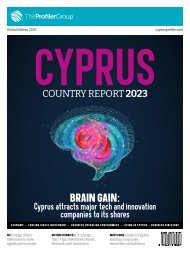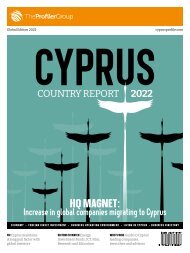2020 Cyprus Country Report
The 2020 Cyprus Country Report features in-depth articles on the economy, foreign direct investment, international trade and headquartering as well as detailed sector profiles and insights from Cyprus’ 100 most influential political, economic and business leaders shaping the future of their country and its industries.
The 2020 Cyprus Country Report features in-depth articles on the economy, foreign direct investment, international trade and headquartering as well as detailed sector profiles and insights from Cyprus’ 100 most influential political, economic and business leaders shaping the future of their country and its industries.
You also want an ePaper? Increase the reach of your titles
YUMPU automatically turns print PDFs into web optimized ePapers that Google loves.
<strong>Cyprus</strong> is<br />
ready to boost<br />
investment in the<br />
sector to secure<br />
its future as both<br />
an established<br />
international<br />
business centre<br />
and an emerging<br />
tech hub.<br />
<strong>Cyprus</strong> include Wargaming, a world-renowned<br />
video game developer, international VoIP IPBX<br />
software developer 3CX, and Viber, the popular<br />
online communications platform. Viber’s success<br />
in <strong>Cyprus</strong> is a good advertisement for the island<br />
as it seeks to attract more tech entrepreneurs.<br />
Viber was started in 2010 by a team of foreign<br />
nationals who needed an EU base with favourable<br />
taxation, so they set up their headquarters<br />
in Limassol. Viber grew rapidly and in 2014<br />
was bought by the Japanese e-commerce giant<br />
Rakuten for US$900 million.<br />
International heavyweights such as Microsoft,<br />
SAP, Oracle and IBM have been present in<br />
<strong>Cyprus</strong> for many years, and the island has long<br />
been a prime location for the fintech industry as<br />
it is home to hundreds of the world’s biggest forex<br />
brokers and online-trading platforms. But there<br />
is room for further development and growth in<br />
the sector for smaller innovative enterprises, such<br />
as Whipper, a ‘chat and play’ gamified digital<br />
messaging platform which opened its headquarters<br />
in Limassol in June 2017. Its founding team<br />
includes executives, investors and advisors from<br />
Netflix, Riot Games, Amazon, Swiftkey, Expedia,<br />
and Viber. The number of fintech and regtech<br />
firms, such as Spotware Systems and Point Nine,<br />
is also growing and taking advantage of <strong>Cyprus</strong><br />
as a gateway into and out of the EU for various<br />
corporate services.<br />
DIVERSIFY OR DIE<br />
With its new focus on long-term development<br />
outcomes, <strong>Cyprus</strong> is determined to diversify<br />
and harness growth with a technology-driven<br />
economy. The biggest spender by far on IT in<br />
<strong>Cyprus</strong> is the financial sector, followed by the telecoms<br />
providers and the public service. Support<br />
and training services form the largest primary<br />
market in <strong>Cyprus</strong>, followed by project and outsourcing<br />
services. There is currently big demand<br />
for support services and skills training in ICT,<br />
especially as communications are increasingly<br />
moving to 3rd Platform technologies, such as<br />
mobile, cloud and big data systems. Services and<br />
software are expected to be the top-performing<br />
segments of the Cypriot IT market in the coming<br />
years, due to continuing demand for quality endto-end<br />
solutions that focus on enhanced user<br />
experience. Innovation and specialisation will be<br />
key elements to succeed in the Cypriot market.<br />
For <strong>Cyprus</strong> to remain competitive largely<br />
depends on how it adapts to new realities like<br />
virtual banking, e-governance, agritech, new<br />
and renewable energies, as well as smart cities.<br />
Business success will depend on how new technological<br />
capabilities will be utilised, and education<br />
and retraining will be absolutely crucial. In<br />
the next five years, there is significant potential<br />
in further developing medical and financial technology,<br />
and Artificial Intelligence (AI) is also<br />
set to significantly change the way companies<br />
conduct their business.<br />
NEW AI STRATEGY<br />
Whether it sparks excitement or fear, there is no<br />
denying that AI has already become an important<br />
part of our world by enhancing key business<br />
processes to help drive value. Today, companies<br />
are racing to adjust their operations to be able<br />
to capitalise on its transformational potential.<br />
<strong>Cyprus</strong> has taken a firm stance in establishing<br />
AI as a driving force for growth and increased<br />
productivity, and an opportunity to transform its<br />
economy.<br />
Considerable progress has already been<br />
achieved in <strong>Cyprus</strong> by developing blockchain<br />
technology and a National Strategy for<br />
Decentralised Technologies has already been<br />
adopted. In January <strong>2020</strong>, the Council of<br />
Ministers approved a new National Artificial<br />
Intelligence strategy with plans to establish applications<br />
to support the technological development<br />
of AI in domains such as universities, public and<br />
private sectors. The aim is to create an ethical and<br />
trustworthy foundation for AI development and<br />
to build an international cooperation network<br />
through <strong>Cyprus</strong>’ participation in EU initiatives.<br />
The strategy also serves as a tool to better engage<br />
with high-tech and start-up companies present<br />
on the island and to attract more players to help<br />
develop this segment.<br />
<strong>Cyprus</strong>-based companies are already being<br />
noticed internationally in the AI sphere. For<br />
example, in its first outside investment fundraising,<br />
machine-learning company Omilia secured<br />
$20 million in funding from Grafton Capital to<br />
continue expanding its conversational AI technology<br />
built for customer care needs of global<br />
enterprises. The Cypriot company has built a<br />
virtual assistant and customer dialogue management<br />
system, where customers can experience<br />
human-level intelligence and machine-level efficiency<br />
when contacting a company, whether<br />
by phone, web chat, social media, SMS, email,<br />
or mobile app. The AI consists of proprietary<br />
speech-recognition software, voice biometrics,<br />
dialogue technology and machine learning,<br />
which the company claims has trained on billions<br />
of interactions since its founding in 2002.<br />
Now the service is fluent in 21 languages, serving<br />
clients such as global banks, mobile operators<br />
and insurance firms. The fresh capital will fuel<br />
go-to-market efforts in Western Europe and<br />
North America, where the company already has<br />
a lucrative customer base.<br />
Sector Profile<br />
<strong>Country</strong> <strong>Report</strong> CYPRUS <strong>2020</strong> 129

















